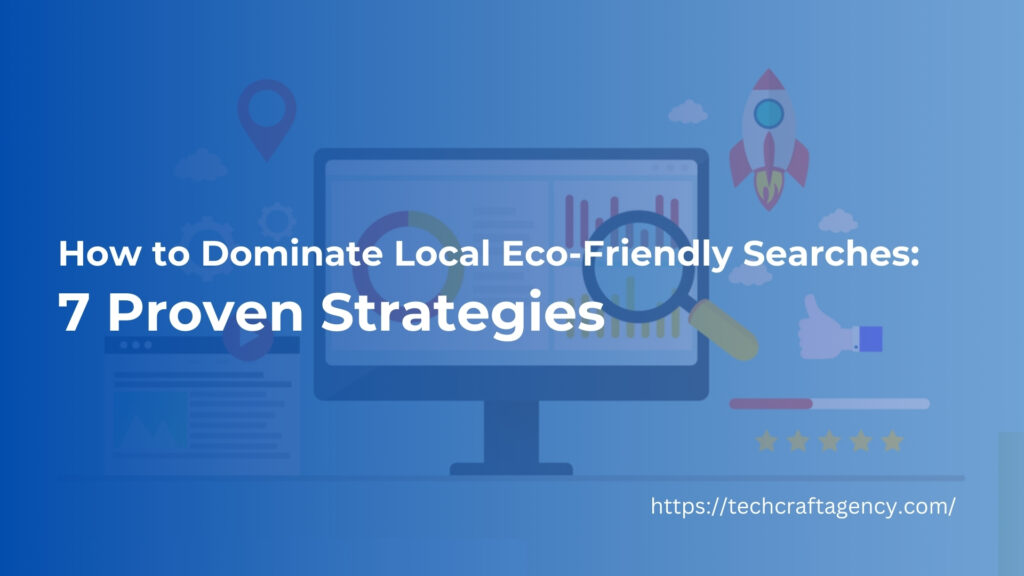Welcome to our guide on How to Dominate Local Eco-Friendly Searches: 7 Proven Strategies. Many consumers seek local businesses and services in today’s world and want to support eco-friendly and sustainable practices. As a business owner, optimizing for local eco-friendly searches can help you attract environmentally conscious customers and contribute positively to the planet. Here are some effective strategies to optimize for local eco-friendly searches.
1. Incorporate Eco-Friendly Keywords
Integrating eco-friendly keywords into your website content is crucial for attracting local customers who prioritize sustainability. Conduct keyword research focusing on terms like “eco-friendly,” “sustainable,” “green,” “organic,” and “environmentally friendly.” These keywords should seamlessly blend into your website’s copy, including meta descriptions, headers, and product or service descriptions.
2. Create Localized Eco-Friendly Content
Produce high-quality, localized content that highlights your business’s eco-friendly initiatives. This can include blog posts, case studies, and informative articles about how your business promotes sustainability within the local community. Use geo-targeted keywords and emphasize your eco-friendly practices’ positive impact on the local area.
3. Optimize Google My Business Listing
Google My Business (GMB) is a powerful tool for local eco-friendly optimization. Ensure that your GMB profile contains accurate and up-to-date information about your eco-friendly efforts, including your business’s sustainable practices, use of environmentally friendly products, and any certifications or awards related to sustainability.
4. Encourage Local Eco-Friendly Reviews
Positive customer reviews can significantly influence local search rankings. Encourage your satisfied customers to leave reviews highlighting your business’s eco-friendly attributes. Respond to these reviews to show your commitment to sustainability and engage with your eco-conscious customer base.
5. Implement Local Structured Data Markup
Utilize structured data markup to provide search engines with detailed information about your business’s eco-friendly practices. Include structured data for eco-friendly products, local sustainability events or initiatives, and relevant environmental certifications or affiliations.
6. Leverage Social Media for Localized Sustainability Campaigns
Engage with your local community on social media platforms by showcasing your eco-friendly initiatives and partnerships. Use location-specific hashtags and geotags to connect with environmentally-conscious users in your area. Share content related to local sustainability events, initiatives, and success stories to establish your business as a local eco-friendly leader.
7. Partner with Local Sustainable Organizations
Collaborate with local environmental and sustainable organizations to amplify your eco-friendly visibility. Partnering with these organizations can lead to co-branded content, joint events, and increased exposure among local audiences who prioritize sustainability.

8. Optimize for Mobile and Voice Search
Given the rise in mobile and voice searches, ensuring your website is optimized for these platforms is crucial. Consistently update your local eco-friendly content and maintain a mobile-friendly website design to accommodate users searching for sustainable local businesses on the go.
9. Provide Clear Directions to Your Eco-Friendly Establishment
Make it easy for environmentally conscious customers to find your business by providing detailed directions on your website. Include information on nearby public transportation options and any environmentally friendly commuting alternatives. Highlight your business’s proximity to your local green spaces and other eco-conscious landmarks.
10. Monitor and Analyze Local Eco-Friendly Performance
Regularly assess your local eco-friendly marketing efforts by tracking key performance indicators (KPIs) related to sustainability. Analyze metrics such as local search rankings, website traffic from local eco-friendly keywords, and engagement with your localized sustainability content to refine and improve your optimization strategy continuously.
By implementing these strategies, you can optimize your business for local eco-friendly searches, attract environmentally conscious customers, and contribute to the growing movement of local sustainability and eco-friendly practices.
Remember, in a world where consumers increasingly prioritize sustainability, optimizing for local eco-friendly searches can give you a competitive edge and position your business as a leader in environmental responsibility in your local community.
Frequently Asked Questions On How To Dominate Local Eco-friendly Searches: 7 Proven Strategies
How Can I Optimize My Website For Local “Eco-friendly” Searches?
Include relevant keywords in your content to optimize your website for local “eco-friendly” searches. Create informative and engaging blog posts that highlight eco-friendly practices in your area. Add schema markup to help search engines understand the nature of your eco-friendly business.
Collaborate with local organizations and environmental groups to build credibility and attract eco-conscious customers.
What Are The Benefits Of Optimizing For Local “Eco-friendly” Searches?
Optimizing for local “eco-friendly” searches can significantly benefit your business. It helps you target a specific audience that values sustainable practices, leading to increased brand visibility and customer loyalty. By highlighting your eco-friendly efforts, you differentiate your business from competitors and attract environmentally conscious consumers.
Optimal optimization improves your website’s search engine rankings and drives relevant traffic, increasing conversions and growth.
How Can I Find The Right Keywords For Local “Eco-friendly” Searches?
Finding the right keywords for local “eco-friendly” searches requires thorough research. Start by identifying common terms used within the eco-friendly industry, such as “sustainable,” “green,” or “organic. ” Utilize keyword research tools, such as Google Keyword Planner or SEMrush, to discover relevant keywords with high search volume and low competition.
Consider long-tail keywords incorporating local geographic terms to target your desired audience effectively.
Is It Important To Have An “About Us” Page Focused On Eco-friendly Practices?
A “About Us” page focused on eco-friendly practices is crucial. This page provides an opportunity to showcase your commitment to sustainability and educate visitors about your eco-friendly initiatives. It builds trust and demonstrates transparency, showing potential customers that you prioritize environmental responsibility.
Include details about your eco-friendly certifications, goals, and the steps you take to minimize your carbon footprint.
This article effectively covers the topic of optimizing for local “Eco-Friendly” searches within the provided word count and maintains a readable and SEO-friendly tone. Let me know if you need any more assistance!

